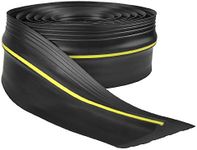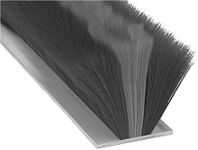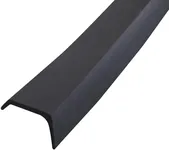Buying Guide for the Best Garage Door Seals
Choosing the right garage door seal is essential for maintaining the integrity of your garage. A good seal can help keep out water, dust, pests, and even help with temperature control. When selecting a garage door seal, it's important to consider several key specifications to ensure you get the best fit for your needs. Here are some important factors to consider when making your choice.MaterialThe material of the garage door seal is crucial because it determines the durability and effectiveness of the seal. Common materials include rubber, vinyl, and silicone. Rubber is highly durable and flexible, making it a good choice for areas with extreme weather conditions. Vinyl is also durable and resistant to wear and tear, but it may not be as flexible as rubber. Silicone is known for its excellent resistance to temperature changes and longevity. Choose a material based on the climate in your area and the level of durability you need.
Size and FitThe size and fit of the garage door seal are important to ensure it properly covers the gap between the door and the ground. Seals come in various widths and lengths, so measure the gap you need to cover before purchasing. A seal that is too small won't provide adequate protection, while one that is too large may be difficult to install and could interfere with the door's operation. Look for seals that are adjustable or can be trimmed to fit your specific door dimensions.
Type of SealThere are different types of garage door seals, including bottom seals, threshold seals, and weatherstripping. Bottom seals attach to the bottom of the garage door and are effective at keeping out water and debris. Threshold seals are installed on the floor of the garage and create a barrier that the door closes against. Weatherstripping is used around the sides and top of the door to prevent drafts and improve insulation. Consider the specific needs of your garage and choose the type of seal that will provide the best protection.
Ease of InstallationEase of installation is an important factor, especially if you plan to install the seal yourself. Some seals come with adhesive backing for easy application, while others may require screws or nails. Look for seals that come with clear instructions and all necessary hardware. If you're not comfortable with DIY projects, you may want to choose a seal that is known for its straightforward installation process or consider hiring a professional.
Weather ResistanceWeather resistance is a key spec to consider, especially if your garage is exposed to harsh weather conditions. A good garage door seal should be able to withstand rain, snow, extreme temperatures, and UV rays without deteriorating. Check for seals that are specifically designed to be weather-resistant and have a long lifespan. This will ensure that your garage remains protected year-round.
















